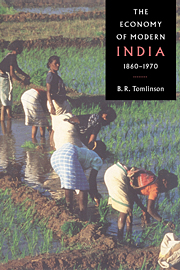Book contents
- Frontmatter
- 1 Introduction: development and underdevelopment in colonial India
- 2 Agriculture 1860–1950: land, labour and capital
- 3 Trade and manufacture, 1860–1945: firms, markets and the colonial state
- 4 The state and the economy, 1939–1970: the emergence of economic management in India
- 5 Conclusion
- Bibliographical essay
- Index
- THE NEW CAMBRIDGE HISTORY OF INDIA
- Map I.I India in 1937-8
- References
1 - Introduction: development and underdevelopment in colonial India
Published online by Cambridge University Press: 28 March 2008
- Frontmatter
- 1 Introduction: development and underdevelopment in colonial India
- 2 Agriculture 1860–1950: land, labour and capital
- 3 Trade and manufacture, 1860–1945: firms, markets and the colonial state
- 4 The state and the economy, 1939–1970: the emergence of economic management in India
- 5 Conclusion
- Bibliographical essay
- Index
- THE NEW CAMBRIDGE HISTORY OF INDIA
- Map I.I India in 1937-8
- References
Summary
Assumptions about the nature and course of Indian economic history lie at the heart of many analyses of South Asia’s recent past. Accounts of peasant society, of political mobilisation, of imperial policy, of the social relations of caste, class and community, all include fundamental hypotheses and expectations about the nature of economic structure and change over time, and the relations between producers, consumers and the state. Furthermore, the whole sub-discipline of development economics, at crucial stages in its evolution, has drawn heavily on the Indian example — in stressing the destructive effects of imperialism, for example, or the mechanisms by which government planning can mobilise savings in poor economies. Modern India is a country where economic history is important, where current issues and problems, and many of the institutions and systems that shape the contemporary economy itself, are closely linked to the legacy of the past.
The wide spread of interest in our subject makes coherent generalisation about it more difficult. Accounts of social relations among rural producers, for example, are usually based on very different theories of the nature of economic behaviour than are institutional studies of government tariff policy, or statistically generated estimates of changes in the composition of the gross national product. The most detailed studies of production and consumption at the village level often assume that economic phenomena in India exist only as a function of social and cultural relations.
Keywords
- Type
- Chapter
- Information
- The Economy of Modern India, 1860–1970 , pp. 1 - 29Publisher: Cambridge University PressPrint publication year: 1993



